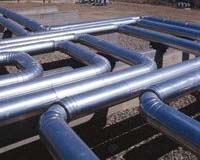 |
Munich, Germany (SPX) Aug 17, 2009 High-rate digestion with microfiltration is state-of-the-art in large sewage plants. It effectively removes accumulated sludge and produces biogas to generate energy. A study now reveals that even small plants can benefit from this process. Sewage plants remove organic matter from wastewater. If the accumulating sludge decays, biogas is generated as a by-product. However, only 1156 of the 10,200 sewage plants in Germany have a digestion tank. Smaller operations, especially, baulk at the costs of a new digestion tank. Instead, they enrich the sludge with oxygen in the existing activation basin, and stabilize it. "Activation basins require a lot of electricity. At the same time, enormous energy potential is lost, since no biogas is produced," says Dr. Brigitte Kempter-Regel of the Fraunhofer Institute for Interfacial Engineering and Biotechnology IGB in Stuttgart. "A sewage plant eats up more electricity in the municipalities than their hospitals do". In a cost-benefit-study Dr. Kempter-Regel has shown that it also pays small sewage plants to transfer to more energy-efficient processes - even if they have to invest in a sludge digestion unit. "Based on a sewage plant for 28,000 inhabitants, we calculate that the plant can reduce its annual waste management costs from 225,000 euros by as much as 170,000 euros if sludge is decayed in a high-rate digestion unit with microfiltration, as opposed to treating it aerobically", she says. This process was developed at IGB and is much more effective than conventional digestion. Instead of the usual 30 to 50 days, sludge only remains in the tower for five to seven days. Around 60 percent of the organic matter is converted into biogas - the spoil is approximately a third more than in the traditional digestion process. The biogas obtained can be used to operate the plant, which, in the case study, would cut energy costs by at least 70,000 euros each year. High-rate digestion has the added advantage of producing less residual sludge needing disposal. "This saves the operator another 100,000 euros", says Kempter-Regel. In addition to high energy prices, budgets are also being hit hard by increasing waste management costs. The use of residual sludge in agriculture is controversial, and slurry can no longer be disposed of on landfills; burning the sludge is a very expensive alternative. So an effective reduction of sludge through digestion pays off. Even small sewage plants have already followed the recommendation of the Stuttgart Institute and converted to the high-rate digestion process. Share This Article With Planet Earth
Related Links Fraunhofer-Gesellschaft Powering The World in the 21st Century at Energy-Daily.com
 Italy launches first clean hydrogen power plant
Italy launches first clean hydrogen power plantMilan, Italy (AFP) Aug 14, 2009 Italian power company Enel said Friday that it had started up a ground-breaking hydrogen-powered electricity plant producing no greenhouse gases. Enel said the 12 megawatt plant, at Fusina in Venice's industrial zone of Porto Marghera, was the first of its kind in the world to operate on such a scale. Powered by hydrogen by-products from local petrochemical industries such as the Eni ... read more |
|
| The content herein, unless otherwise known to be public domain, are Copyright 1995-2009 - SpaceDaily. AFP and UPI Wire Stories are copyright Agence France-Presse and United Press International. ESA Portal Reports are copyright European Space Agency. All NASA sourced material is public domain. Additional copyrights may apply in whole or part to other bona fide parties. Advertising does not imply endorsement,agreement or approval of any opinions, statements or information provided by SpaceDaily on any Web page published or hosted by SpaceDaily. Privacy Statement |